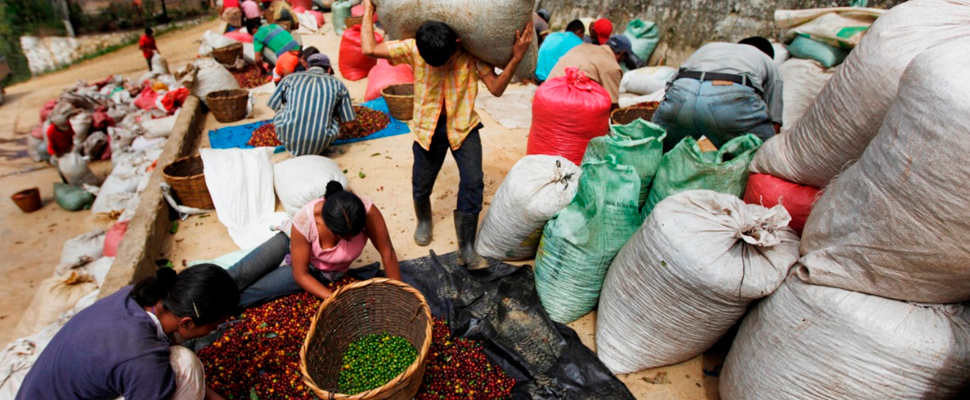Coffee slump reaps bitter harvest for Central American migrants
Listen to this article
"My husband had to emigrate due to debt and because coffee cannot even provide for food here," Carmen Andino

Toward the end of 2018, Honduran coffee farmer Mario Lopez paid a human smuggler, or coyote, to take him to the United States in a bid to escape the economic ruin engulfing him at home.
Leer en español: El trago amargo que deja la cosecha de café en Centro América
In mid-November, the coffee farmer and his 12-year-old daughter undertook a perilous 35-day journey up through Mexico after a collapse in international coffee prices destroyed the business that he had dedicated his life to, his wife told Reuters.
"My husband had to emigrate due to debt and because coffee cannot even provide for food here," said Carmen Andino at the door of their home, a modest adobe building in La Colonia.
Shortly before Christmas, Lopez and his daughter entered the United States.
Since then, he has sent money to his wife and three children who stayed behind in La Colonia, a rural town in central Honduras dominated by cultivation of coffee, the country's top agricultural export.
"With prices where they are, there is nothing to be done," she added, looking at the plantations that once supported the family, now abandoned because they cannot be maintained.
International coffee prices in May hit their lowest levels in 13 years, due largely to surging output in Brazil and Vietnam, though prices have since recovered some of those losses.
Lopez's story is typical among the dozens of arabica coffee growers Reuters spoke with across Costa Rica, El Salvador, Guatemala, Honduras and Nicaragua, who have swelled the ranks of migrants trying to enter the United States and stoked the ire of U.S. President Donald Trump.
In the first eight months of the current U.S. fiscal year, which began in October, the number of migrants detained or refused entry at the U.S.-Mexico border exceeded 570,000 – more than the total for all of the previous year.
The vast majority of those migrants were from Central America.
The region accounts for 10% of the world's output of arabica, a high quality coffee bean used to prepare espresso and gourmet blends. The coffee business is worth around 5% percent of gross domestic product in Honduras.
Officials are still assessing the impact of the phenomenon, which is hurting an industry that employs hundreds of thousands in some of the poorest nations of the Americas.
Also read: Libra: this is how Facebook plans to introduce a cryptocurrency
DANGEROUS JOURNEY
"We haven't been able to sell coffee this year. It's not profitable for anyone to be working in coffee," lamented David Ramirez, 55, a coffee farmer in Camotan in southeastern Guatemala, one of the country's main coffee-producing areas.
At the start of 2019, Ramirez said he paid a coyote $2,600 to take his youngest child Delmi, 17, to the United States because she could not find work in Guatemala.
"Due to the coffee crisis we have no money, partly because of that my daughter Delmi left. But she died there, she got ill in the United States," Ramirez said by his mud-brick house, surrounded by wilting coffee plants.
The farmer, who is now growing corn to pay off his debts, said several neighbors had gone to the United States in search of a better future. But most, he said, had sent their children northward and stayed on to work the land, hoping coffee prices would recover.
In Honduras, the government is crafting a plan to provide financing and new machinery for coffee farmers, but the industry says that plan risks putting them into more debt.
"What the grower needs is to fertilize his plantation and money to feed his family," said Dagoberto Suazo, vice president of Honduran coffee association IHCAFE.
Coffee has long been a pillar of economic and social development in poor areas between southern Mexico and Panama, known as the "Corredor Seco," or Dry Corridor – a strip of land that has fallen prey to damaging droughts in recent years.
Almost half the coffee-producing areas in the corridor have been under cultivation for more than 25 years, making them "aged" in growers' terms. That has prompted calls from the national coffee-producing associations to secure new plots.
But the struggles faced by today's producers are having a knock-on effect on their offspring.
"The children no longer want to dedicate their lives to coffee," said Luisa Fernanda Correa, general manager of Anacafe, the association representing Guatemalan coffee growers.
"If children see their parents are not making a success of it, the business doesn't interest them," she said. "They prefer looking for work in other industries."
Reuters | Gustavo Palencia and Sofia Menchu




